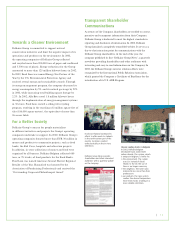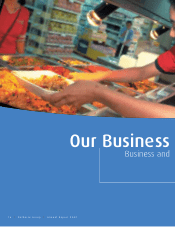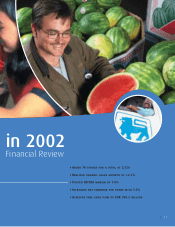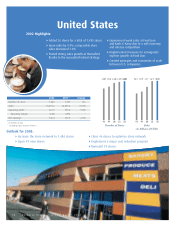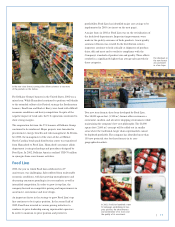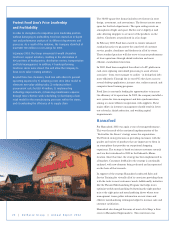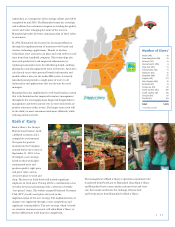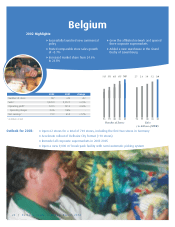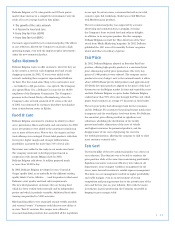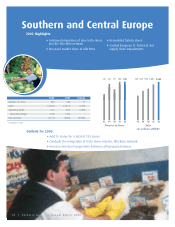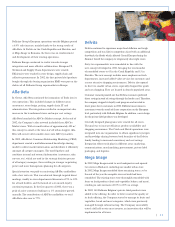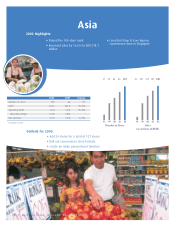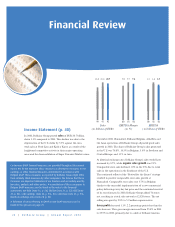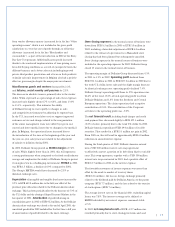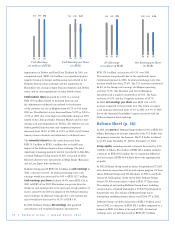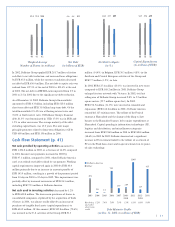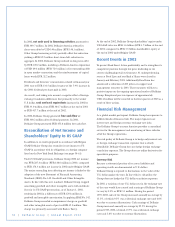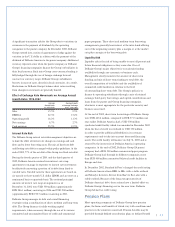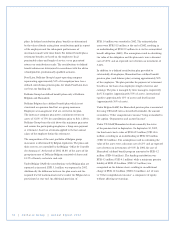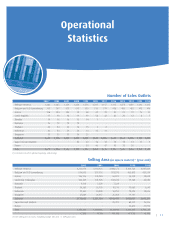Food Lion 2002 Annual Report Download - page 27
Download and view the complete annual report
Please find page 27 of the 2002 Food Lion annual report below. You can navigate through the pages in the report by either clicking on the pages listed below, or by using the keyword search tool below to find specific information within the annual report.
|25
Delhaize Group’s European operations outside Belgium posted
a 6.9% sales increase, mainly thanks to the strong results of
Alfa-Beta. At Delvita in the Czech Republic and Slovakia, and
at Mega Image in Romania, the focus was on reinforcement
and development of their existing operations.
Delhaize Europe continued to evolve towards stronger
integration and more effective collaboration. European IT,
Te chnical and Supply Chain departments were created.
Efficiencies were reached in store design, supply chain and
collective procurement. In 2002, the first private label products
bought through the buying organization EMD were put on the
shelves of all Delhaize Group supermarkets in Europe.
Alfa-Beta
In Greece, Alfa-Beta continued the integration of Trofo into its
own operations. This included changes in different areas:
assortment, store design, pricing, supply chain, IT and
administration. The integration resulted in an important sales
increase in the transformed stores and major cost savings.
Alfa-Beta launched the AB City Market concept. At the end of
2002, the Company’s sales network included three AB City
Market stores. With its small surface of approximately 450 m2,
this concept is aimed at the time-starved urban shopper. Alfa-
Beta will convert all its smaller stores into AB City markets.
In 2002, Alfa-Beta’s Consumer Relationship Marketing (CRM)
department created a multidimensional knowledge-sharing
model to collect market information and distribute it efficiently
amongst all category managers. The model gathers and
combines internal and external information (customers, sales,
surveys, etc), which are used in the strategic decision process
of all category managers, thus resulting in stronger negotiating
power and more homogenous planning for all categories.
Special attention was paid to reactivating AB Plus cardholders
with a low visit rate. This was achieved through targeted direct
mailings, weekly in-store departmental discounts of 5% to 10%
for all card holders, and the launch of a six-month loyalty
continuity program. In the first quarter of 2002, there was a
peak of active customers leading to a 1% cumulative growth
annually. The contribution of AB Plus cardholders to total
Alfa-Beta sales rose to 77%.
Delvita
Delvita continued to experience major food deflation and tough
competition and was, like its competitors, faced with an additional
drawback: the floods which affected Central Europe during the
Summer forced the company to temporarily close eight stores.
Sixty-two supermarkets were remodeled in line with the
new concept developed in 2001, bringing the total number
of remodeled stores to 63 in the Czech Republic and 15 in
Slovakia. The new concept includes more emphasis on fresh
departments, increased added-value services for customers and
a more attractive shopping environment. Delvita also opened
its first two smaller urban stores, especially designed for quick
and easy shopping. They are located in densely populated areas.
Customer research pointed out that Delvita customers preferred
direct savings instead of savings through the loyalty card. Therefore,
the company stopped its loyalty card program and invested in
lower prices for its customers in 2002. Different innovations in
assortment were the result of closer cooperation on the European
level, particularly with Delhaize Belgium. In addition, a new design
for the private label products was developed.
Centrally designed planograms were created for all stores.
The goal was to increase efficiency, product availability and
shopping convenience. The Czech and Slovak operations were
integrated into one organization to obtain significant synergies
and knowledge sharing between both branches of the Delvita
family, leading to increased consistency and cost savings.
Integration efforts took place in different areas: marketing,
communications, merchandising, procurement, private label
packaging, and logistics.
Mega Image
In 2002, Mega Image moved to new headquarters and opened
two stores in Bucharest, including one smaller urban store.
In 2002, Mega Image remodeled three remaining stores, so by
the end of the year the complete store network had been
remodeled. The existing stores were thoroughly remodeled with
focus on fresh products (fruit and vegetables, bakery, and meat),
resulting in sales increases of 10% to 20% on average.
In 2002, 140 Delhaize Belgium’s private label products were
added to the offering. In order to better control the quality of
its fresh offering, the Company started to manage its fruits and
vegetables, bread and meat categories, which were previously
managed through subcontracting. The Company successfully
tested a full self-service meat counter, an innovation that will be
implemented in all stores.


